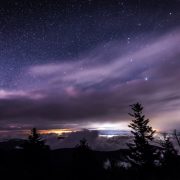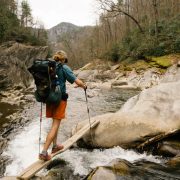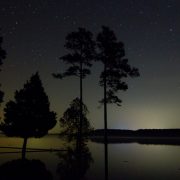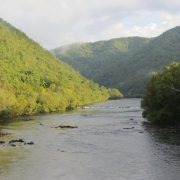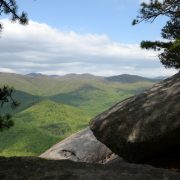What are the Blue Ridge Mountains besides an immense exhibition of natural beauty: wide-open vistas overlooking an ocean of rolling mountain peaks, rivers of whitewater and clear pools with wildflowers clustered at the banks, sunlight catching rainbows on the curtain of a waterfall. You could wander this wilderness for season after season, camera at the ready, and never get a disappointing shot. But if you’re looking to stand amidst the most dramatic and picturesque landscapes that Western North Carolina has to offer, here are our top five—the best of the best, the cream that rises to the top—a photographer’s paradise.
1. Hawksbill Mountain

James Lautzenheiser
At an elevation just above 4,000 feet, the panoramic views from the summit of Hawksbill Mountain are as stunning as anything you will find this side of the Mississippi. A steep and strenuous 1.5-mile hike through the Linville Gorge Wilderness Area culminates in a tremendous reward: a jutting outcrop of rock where you can perch and shoot photos of the granite-rippled summits of Grandfather Mountain, Table Rock and Shortoff Peak, and beyond them a rolling mountainscape so far reaching that, on certain clear evenings, the glittering lights of Charlotte are visible. Peer below into the canyon of the gorge and you will see the powerful Linville river cutting through the valley floor some 2,000 feet below you.
2. Crabtree Falls

Forest Wander
Forty-five miles north of Asheville on the Blue Ridge Parkway, Crabtree Falls is a study in contrast: a gauzy white veil of water spilling over 70 feet of black rock, nestled inside an emerald forest. Photographing water is an art form in and of itself, and this unique aquatic feature, which some say resembles a massive, dark beehive, is an impressive subject. From the bridge that spans the creek directly in front of the falls, you can shoot the spectacle in any number of ways, from a close-up snap of water droplets, sharp and suspended, to a wide angle, slow shutter-speed capture of swirls and soft curtains.
You can access the base by a 3 mile out-and-back trail, or climb to the ridge just above the falls via a slightly more strenuous 3.5-mile loop.
3. Roan Mountain

discutant
In the summertime, Roan Mountain becomes so spectacular with blooming Catawba Rhododendrons that an annual festival is held on its grassy summit each June, celebrating the rare beauty of these natural gardens. Bright fuchsia and deep purple blossoms set against a background of dark green spruce-fir forest and an entire spectrum of blue rolling off into the distance creates a pallet so rich and resplendent it would be impossible to take a mediocre photo.
The ridge line that compiles Roan Mountain—the longest continuous stretch of grassy balds in the Appalachians—remains one of the South’s most picturesque landscapes in every season. Flame azalea light up the mountains in spring, in autumn the forests are ablaze with wildfire foliage, and in winter the pristine balds sparkle under smooth blankets of heavy snow. The best day hiking begins at Carver’s gap and traverses five miles over Round Bald, Jane Knob and Grassy Ridge. The Appalachian trail runs through these mountains, offering a wealth of options for overnight backpacking. Whether you’re out for the day or out for a week, in the heat of summer or the tangy cool of autumn, just remember to pack your camera.
4. Max Patch

With all the hype surrounding Max Patch, you may be tempted to believe that this pastoral Appalachian destination is overrated. That notion, however, will vanish the moment you arrive, and realize that it would be impossible to oversell the sheer beauty and scale of the place. Located on the western fringe of the Appalachians, the meadow remains one of the most photographed and iconic landscapes in the Southeast and beyond, and holds the title as the prettiest spot on the Appalachian Trail.
“The Patch” itself is lovely and vast, acres of rolling green hills dotted with wildflowers that spread out in all directions, creating a bucolic setting for hikers, picnickers, kite-fliers, star-gazers and, of course, photographers. However it’s the views—soaring, panoramic, and seemingly endless—that award this field its fame. The Great Smoky Mountains and the formidable Black Mountain range dominate much of the skyline, but the lush Tennessee flatlands to the west allows for a brilliant and unparalleled sunset view. A tripod will help you to capture all the delicate and elusive layers of color from the sun’s last rays.
5. Black Balsam Knob

Melina Coogan
Never have you seen colors so bright and saturated as you will on the alpine summit of Black Balsam Knob. The weather changes fast up there during the summer months, with frequent thunderstorms sweeping in, dark clouds gathering and then dissipating just as quickly, unveiling cobalt blue skies. Sitting on a rocky outcrop on the Art Loeb Trail and watching clouds of mist swirl up the mountainside, temporarily obscuring the view of the Blue Ridge, the highlands of the Pisgah National Forest, and the fertile French broad valley down below, enveloping you in a cooling mist, is one of the more memorable experiences you will have in this wilderness.

Mary Anne Baker
The ribbon of trail winding over the ridge that connects Black Balsam and Sam’s Knob endows the enormous, dramatic mountain-scape with a sense of depth and scale, as well as a leading line that will add story and purpose to your photos. Easily accessible via a half-mile hike on the Art Loeb Spur trail, Black Balsam Knob may be the most popular spot for shooting sunsets in the entire region.
Originally written by RootsRated.
Featured image provided by Kenny Lex



